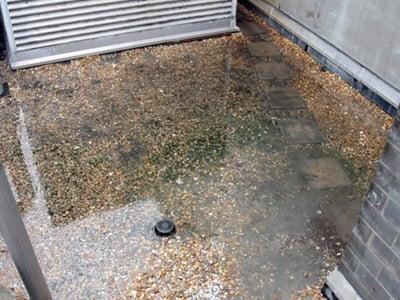Do you have a proactive weather management strategy?

By Benchmark, Inc.
Considering today's extreme weather, it's crucial that facility managers have a tailored asset management plan to become more storm-resilient tomorrow.
Lately, weather changes have significantly impacted the flow of business operations everywhere, and more recently in the Southwest U.S. These storms have shifted from minor irritations to significant operational hazards for those managing facilities, making an established proactive strategy in facility management critical.
Hidden weather pitfalls
Weather changes might not always be on your radar when it's business as usual, but trust us, those shifts are now critical to your bottom line. Understanding how to strengthen and adjust your strategy could mean the difference between consistent operation and critical downtime.
Picture this: you're overseeing a healthcare facility, then out of nowhere, a storm hits!
The roof drainage clogs and water starts to build up, your parking lot is taking on an absorbent amount of road runoff that the storm drain cannot handle and the parking lot is flooding – it's a race against the clock to prevent water from seeping into your building. It's a scenario no one wants to live out, but one that's increasingly common in our region.
Storms pose unique risks, from immediate water damage to long-term structural issues. For facilities managers, these problems often come without warning, but leaving them unchecked is no longer an option.
Identifying areas of vulnerability
What spells out 'disaster' for your facility in a sudden downpour often begins with the outermost layers of your physical space — the rooftop and the pavement. They're the silent guardians of storm resilience, bearing the brunt of wind, water and lightning, and when weaker, you can be in for a world of trouble.
When those storms hit, they place immense pressure on your roof, your first line of defense. Overlook a leak and you could be dealing with more than a simple mopping job — it could mean halting operations, dealing with structural deterioration and even health hazards.
Debris is a major contributor to post-storm drain clogs and roof floods. It's essential to have a maintenance schedule in place to clear build-up regularly.

Immediate tracking of post-storm repairs is a cost-effective measure that not only addresses damage but also prevents the resurgence of exterior threats that could wreak havoc inside. In some instances, if the damage is extensive, making the call for a complete roof replacement is the smart long-term move.
However, the challenges don't end at the rooftop; the pathways that lead water away from your facility are equally critical. Intense rainfall has the potential to trigger pavement erosion and undercutting, as well as introduce additional challenges that could significantly jeopardize the structural integrity of a facility's foundation. One of the most prevalent issues is the emergence of potholes, formed when water penetrates through cracks in the pavement and destabilizes or washes out the sublayer. As vehicles pass over these weakened areas, the asphalt collapses, forming potholes that can result in costly damage to vehicles and pose risks to pedestrians. They're not just a nuisance – they're a potential safety hazard and a lawsuit waiting to happen.
Accumulated water can not only wipe away your pavement markings, causing confusion and potentially dangerous situations for drivers and pedestrians, but also increases the risk of hydroplaning, which could result in accidents.
To mitigate these risks, schedule regular inspections and maintenance of pavement surfaces. Making sure the drainage structures and storm sewer pipes are not blocked or clogged can drastically reduce the incidence of ponding and pavement failures. Employing durable, high-quality pavement materials, coupled with timely crack and joint sealing and restriping, are proactive measures to ensure longevity and maintain safety standards under adverse weather conditions.
Ready, set, act – and fund
Here's the deal: being weather-ready involves preparation, action and some financial savvy.
You can't protect your operation without knowing what you're up against. It's critical to have your roofing and pavement assessed by experts to spot any potential issues. Training your staff to respond quickly and effectively in an emergency is equally important.
Transition the pattern from reactive to proactive by implementing a regular maintenance schedule that anticipates wear and tear before they become emergencies. Go for quality and innovate when choosing construction materials – this approach is practically stormproof. Regular post-storm reviews will help refine your action plans for even better protection in the future.
Finally, financial planning for immediate storm response and long-term risk mitigation should be a budgetary priority understood at the highest levels of an organization. Understanding the role of insurance, especially in cases of extreme weather, is vital as it becomes a safety net that can catapult your recovery processes post-storm. Adopting sustainability measures isn't just environmentally responsible; it's also a forward-thinking strategy against weather risks.
Be resilient
The business impact of unpreparedness can be dangerous. Downtime costs, repair expenditures and even the loss of clientele trust can create a ripple that's hard to control. But with a proactive approach, these challenges can be turned into proof of your organization's resilience and adaptability.
Unpredictable weather is now a reality that demands strategic focus. Facility managers and engineers can lead a charge towards a more storm-resilient tomorrow.
Original article source: Benchmark
Learn more about Benchmark in their Coffee Shop Directory or visit www.benchmark-inc.com.






















Comments
Leave a Reply
Have an account? Login to leave a comment!
Sign In